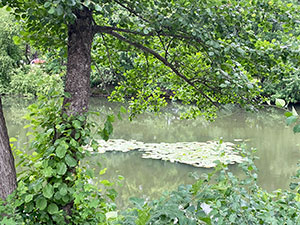
Consultants from the Massachusetts Water Resource Authorities (MWRA), along with officials from Somerville and Cambridge, recently engaged with the public on the issue of combined sewer overflows.
By Michael McHugh
On Wednesday, June 29, the cities of Cambridge and Somerville, as well as consultants from the Massachusetts Water Resource Authorities (MWRA), held the first of a series of meetings to create a dialogue with the public regarding the cities’ managing of combined sewer overflows (CSOs).
CSOs are flooding events typically caused by extreme weather conditions that push the combined stormwater and sewage systems past their capacity. Rather than directly flooding into homes and streets, this system discharges the sewer system through outfalls into local waterways such as the Alewife Brook or Charles River.
Last year having highly irregular levels of rainfall, assumed to be largely due to climate change, an estimated 51 million gallons of discharge to the Alewife Brook alone was recorded (as outlined in the annual CSO discharge report).
These rapidly developing changes to our environment require updated CSO control plans, which Cambridge, Somerville, and the MWRA are responsible for completing by the end of 2023.
 According to Cambridge’s Community Relations Manager Kate Riley, with over 25 years of development and nearly a billion dollars invested, “The long-term control plan was successful in reducing the CSM volume discharge by 87% permanently, closing almost half of the CSO outfalls and providing treatment for 93% of the remaining overflows. While successful in many ways, there are still a few projects and evaluations underway to reduce CSOs further at several sites to meet the activation and frequency goals of the original long term control plan.”
According to Cambridge’s Community Relations Manager Kate Riley, with over 25 years of development and nearly a billion dollars invested, “The long-term control plan was successful in reducing the CSM volume discharge by 87% permanently, closing almost half of the CSO outfalls and providing treatment for 93% of the remaining overflows. While successful in many ways, there are still a few projects and evaluations underway to reduce CSOs further at several sites to meet the activation and frequency goals of the original long term control plan.”
In the first of the public meetings that will take place over the next year and a half, Cambridge, Somerville, and the MWRA outlined how they plan to increase sewer system capacity, implement new green infrastructure, collaborate with town residents, and further improve local water resources and mitigate CSOs before the given deadline.
Time was given during the latter half of the meeting to receive questions from the public, one of which was in regards to what residents can do on an individual level to mitigate flooding and water quality issues.
As for reducing flooding, rain barrels, rain gardens, window wells, and any other means of keeping rain out of their storage and drainage systems can reduce the burden placed on the overflows. Some small steps toward improving water quality, such as reducing fertilizer use and managing pathways, can also add up to have a large impact.
The City of Somerville’s website also contains a “Flood Ready” page with strategies for individuals to mitigate, plan, and prepare for floods. Many of the attendees of the first meeting resided in towns other than Somerville and Cambridge, who are equally affected by CSOs despite their local governments not being legally responsible for managing said CSOs.
For residents of Arlington or Belmont who are directly impacted by these CSOs, many felt that they were not “given a seat at the table” in regards to input on the developing CSO control plans.
“When the Alewife Brook floods, raw sewage goes into the yards and residences of Arlingtononians, so what is the best way for the effective people to get an equal seat at the table in the process of this?” asked Arlington resident Michael Cohen.
“We want to work collectively and collaboratively with everyone. And so that’s why we’re having this meeting.” said Kathy Watkins, Cambridge’s Assistant Commissioner for Engineering of Public Works, “I think one of the things we would love to hear from folks is their suggestions for how best to reach out to folks and have people engaged in the conversation. That’s really going to be the plan that we’re all working on over the next year, is to understand what the options are, what the cost of those are, what’s the best way to really improve water quality, reduce flooding, and manage all these things that we all collectively want to work together on.”












Reader Comments